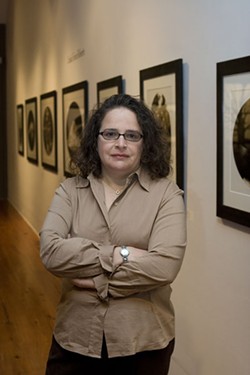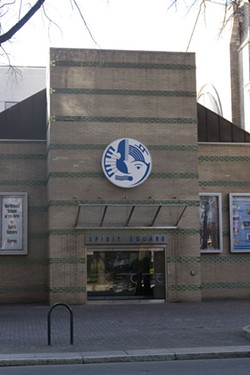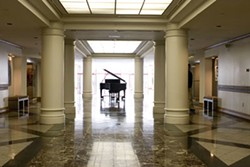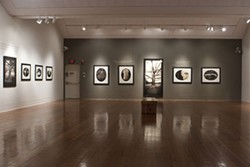A Comedy of Errors
Inside the war to save — and destroy — Charlotte's arts scene
Charlotte's political class has spent thousands of dollars on consultants to advise them on how to be cool so they can attract the so-called "creative class," the coveted young over-achievers thought to be critical to the future success of U.S. cities.
It wasn't enough to just have football and baseball teams, they learned. They needed coolness, funkiness and gritty, organic authenticity. They needed a vibrant arts and cultural scene to complement chic renovated period neighborhoods.
So this year, politicians spent hundreds of millions of taxpayer dollars creating a synthetic arts scene with a dull veneer of organic authenticity. Parts of it would be housed, at taxpayer and bank expense, in an as-yet-unnamed, clean-cut, government-approved, mixed-use bank and arts campus in partnership with Wachovia.
And still they wonder how to attract the authentic, the kind of feel that makes places like New York's SoHo, Austin, Texas and Portland so cool. But all over Uptown, there are parking lots and arenas where cool funky buildings once stood.
At 611 West 5th Street, a parking deck sits on the lot that just four years ago was home to a stunning 18,800-square-foot warehouse built in 1928. Over eight years, Cindy Hart and her family scrubbed graffiti and painted and repaired over 1,000 broken windows while battling crime and vagrants. Hart turned the space into low-cost lofts, studios, galleries and performing space for the emerging artists she was attracting to Charlotte.
Run successfully without a dime from the government, some of the art displayed for purchase on the walls of the gallery was breathtaking. Word spread. Law firms began scheduling company parties in the space.
But when the condemnation notice arrived from the North Carolina Department of Transportation, Hart begged local political leaders who could have used their influence to stop the demolition for help. No one cared. The government paid her less than market value for the property, turned her business upside down and her building to rubble, then built the parking deck.
The Hart-Witzen Gallery, now pushed out of Uptown, reopened out of site in the 36th Street area in a space that didn't come close to having the amenities Hart's gallery had Uptown.
"The arts aren't allowed to sit on expensive land," says Hart. Hart sees some parallels with what happened over the past six weeks with Spirit Square.
The same sort of artistic synergy that was killed off on 5th Street is alive at Spirit Square, which combines uniquely designed small theaters and gallery space inside and around an old church. A certain electric synergy was created by the architecture of the church as a whole, the individual theaters, the galleries and the five resident cultural organizations, including the film- and photography-oriented Light Factory and the BareBones Theatre Group. Added to that are arts-oriented magnet middle and high schools that keep the place alive during the day.
All of it together creates a unique sensory wallop you'd have to visit Spirit Square to understand. That sensory wallop is exactly what consultants have been trying to describe to civic leaders in Power Point presentations, exactly what they are currently spending millions of dollars to create and foster Uptown.
Yet in order to help fund infrastructure for a new baseball stadium, political leaders had decided to sell much of Spirit Square and evict the arts groups there until a public outcry halted them in their tracks.
"It's a critical mass of cultural activity that if it didn't exist in Charlotte, we would try to create it," says Lee Keesler, president of the Arts & Science Council. "That is perhaps the irony of the whole thing."
Keesler says that it only looked like arts and civic leaders were caught off guard by the county's plans for Spirit Square, which have been in the works since last June. The ASC, which raises millions of private dollars for arts and cultural groups and doles out millions more in taxpayer dollars for local government, had been in touch with arts and cultural groups that reside at Spirit Square, some of which get small grants from the ASC, about the impending sale and their need to vacate and find alternative solutions, Keesler said.
But that's not the same thing as mounting a campaign to stop it. It wasn't until two weeks ago, after the public outcry, that the ASC stepped into the public forefront of the battle to preserve the programming and key architectural parts of Spirit Square.
What the ASC does or doesn't do is critical to the arts and cultural scene here because it serves as a vacuum, sucking up private arts dollars that could go directly to smaller start up groups. A chunk of that money ends up funding blue-blood establishment groups like the symphony and others.
It leaves the rest of the arts scene out in the cold, with no one to advocate for places like Hart-Witzen or for Spirit Square.
Mecklenburg County Commission Chairwoman Jennifer Roberts says that though it appeared that county politicians were caught off guard on Spirit Square, the county always intended to preserve the physical parts of Spirit Square that make up the old church and McGlohon Theatre. She says they had been talking about the changes to Spirit Square since last year.
But at a recent meeting, Mecklenburg County Commissioner Dan Bishop and others expressed surprise at the level of activity going on at Spirit Square.
Anne Lambert, managing director of BareBones Theatre Group, says she thinks that well-meaning arts and political leaders like Keesler and others invested so much time and energy into the new facilities plan and Wachovia arts campus that smaller projects like Spirit Square were lost in the shuffle.
Lambert doesn't see anything malicious going on here. Long-time arts patrons were as bewildered as everyone else about how Spirit Square got to this point, she says.
But she shares Hart's frustration with the bungling and shortsightedness that perpetually dooms the arts scene here and costs taxpayers more money as local governments attempt to recreate burgeoning culture that inadvertently gets smashed when no one realizes its value because it lacks high-dollar patrons or hasn't made the list of government-approved grant groups.
"People always ask what it is about Charlotte that can't foster that creative-class culture," says Lambert. "I am working as hard as I can to foster that culture. I am at the dead center, ground zero of creative class culture because I manage a grassroots fringe theater company, but I can't get $10,000 to save my life. In any other town we'd be the sexiest thing going."
Lambert says that with the ASC serving as the only de facto machinery for raising money, Charlotte is doing the best possible job we can do to support what she calls the "high arts" or the "established arts."
"But we are doing a crappy job of supporting the smallest, most fragile groups and those are the groups that are the algae in the food chain," Lambert says. "When they are dying, the sperm whale is also in danger. Where are people that mirror the behaviors of other philanthropists in other communities like Atlanta or like Philadelphia? Smaller communities in other states have that groundswell of grassroots support that we don't."
Long-time arts and community advocate Cyndee Patterson says she didn't realize that Spirit Square was part of the baseball land swap deal until after the first of the year.
"People were stunned," she says. Patterson thinks that politicians were just uninformed about what was going on in the building.
"It was sort of a myth where they said this is pretty unproductive property and nobody really owns it anymore," says Patterson. "I'm not even sure they knew we had 200 school kids a day run through Spirit Square."
Another problematic mind set typical of Charlotte may have been at work in the Spirit Square controversy, says Patterson.
"It's old," she says of Spirit Square. "In this community, 10 years is old. We scratch it and start over. I think that is part of it. I think they were focused on all these new arts facilities and why would you need Spirit Square? The truth of it is all the new facilities demand that you continue to have a Spirit Square because they don't offer what Spirit Square does."
Latest in Cover
Calendar
-

Queen Charlotte Fair @ Route 29 Pavilion
-

NEW WINDOW GALLERY-Pat Rhea-ACRYLIC PAINTINGS-April 05-30 2024 VALDESE, NC 28690 @ New Window Gallery/Play It Again Records
- Through April 30, 12 p.m.
-

TheDiscountCodes
-

"Blood Residue Analysis of Paleoamerican Stone Tools in the Carolinas" @ Native American Studies Center
- Fri., April 26, 12-1 p.m.
-

Brightfire Music and Arts Festival @ GreenLife Family Farms














